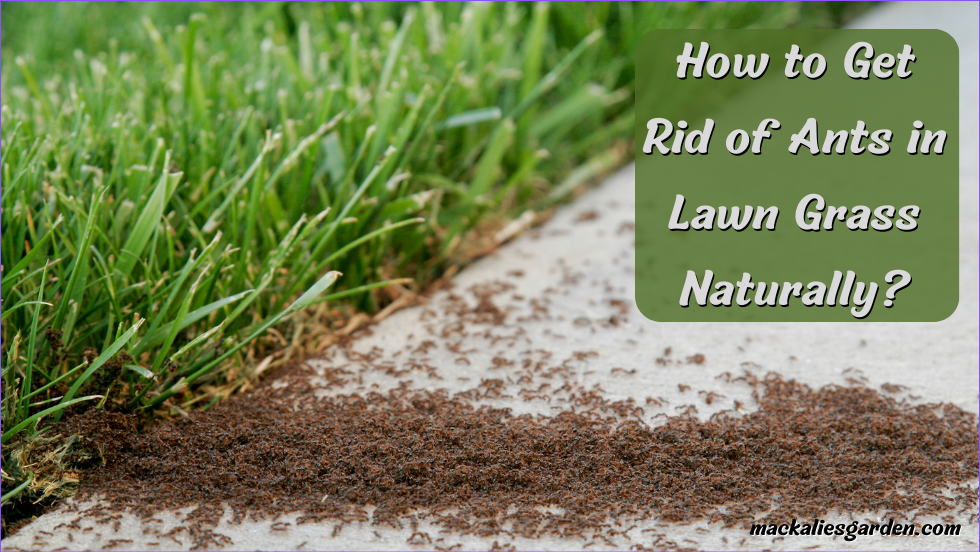Are you looking for a natural and effective way to eliminate ants in your grass? As a pest control specialist, I understand how frustrating it can be to deal with ant infestations.
Ants may be tiny, but they can create big problems when they invade your lawn. They not only ruin your yard’s aesthetic appeal but can also threaten people, pets, and other plants. If you have an ant problem in your grass, follow this simple, environmentally friendly guide to kill ants in the yard or eliminate them quickly and safely. I
n this blog post, I’ll share my knowledge of how to naturally get rid of ants in the grass without resorting to hazardous chemicals or costly treatments. Not only will you learn the best methods I have used for years as a professional pest control expert, but you’ll also gain valuable insight into why certain grass weeds attract ants and what preventive measures you can take before they become an issue.
Do Ant Species Pose a Threat to People?
The National Wildlife Federation suggests that there are over 12,000 types of ants across the globe. Generally, they do not put humans in danger. Nevertheless, they can transmit diseases and bacteria due to their carrying capacity.
A small 2019 animal study showed that Monomorium ants might spread pathogenic microorganisms, which could be dangerous for human health. An older 2005 study also indicates that Pharaoh ants from the same family might lead to allergies or bronchial asthma. Typically, however, most types of ants don’t pose a risk to people.
Identify the Type of Ant Infesting Your Lawn
Before taking any action, it’s crucial to identify the type of ant present in your grass. Different ants have different behaviors and may require unique strategies to eliminate them effectively.
- Fire ants are red or brown and typically create large grass mounds. Their bite can be painful, and some people may have allergic reactions to their venom.
- Carpenter ants are generally black or dark in color and construct their nests in decaying wood, posing a danger to trees and other wood structures in your yard.
- Sugar ants are also known as odorous house ants or pavement ants. They are small and attracted to sweets, leaving a faint, unpleasant odor when squashed. They usually don’t pose a risk to people, pets, or plants, but their colonies can be vast, and they can become a nuisance quickly.
- Pavement Ants: These tiny, dark brown ants typically build their nests beneath pavement or concrete slabs and can enter your home searching for food.
- Pharaoh Ants: Tiny, light yellow to reddish-brown ants that can spread quickly through homes and yards, making them difficult to control.
Knowing the types of ants is essential to apply ant control effective measures specific to each species.
How to Get Rid of Ants In Grass Naturally?
There are several eco-friendly ways to control ants in your lawn. Here are some natural ingredients that can disrupt an ant’s sense of tracking or create an unappealing environment for them:
Diatomaceous Earth (DE)
DE is a natural, non-toxic mineral that can be used as an effective ant deterrent. When ants come into contact with DE, it damages their exoskeleton, eventually leading to dehydration and death.
Application: Sprinkle food-grade diatomaceous earth around the ant mounds and other areas where ants are active. Apply it during dry weather, and reapply after rainfall or lawn watering. Maintain a protective barrier of DE throughout the infestation period.
White Vinegar
The pungent smell and acidity of white vinegar can disrupt an ant’s tracking abilities and deter them from your yard.
Application: Mix equal parts water and white vinegar in a spray bottle. Apply the solution to ant-visited spots and ant hills. Be cautious not to spray directly on plants, as vinegar can harm them. Reapply the solution every few days.
Baking Soda/Baby Powder
Baking soda or baby powder can confuse ants and prevent them from returning to their nest.
Application: Lightly sprinkle baking soda or baby powder on ant trails and around ant mounds. Reapply every few days or following rain.
Boric Acid Traps
Boric acid is another natural substance that can effectively control ants. Be cautious while using boric acid, as it can be toxic to pets and children if ingested in larger quantities.
Application: Mix sugar and boric acid equally to create a homemade ant bait. Place small amounts of the bait near ant trails or mounds. Replace the bait daily and keep it away from pets and children.
Soapy Water
A soapy water solution can deter ants by removing their scent trails, making communicating and locating food sources difficult.
Application: Mix a few teaspoons of dish soap with water in a spray bottle. Spray directly on ant trails, mounds, and other active areas. Reapply regularly until the infestation is eliminated.
Few other items: How to get rid of ants in yard
- Salt
- Baby powder
- lemon juice
- Chalk
- Bay leaves
- Cinnamon or peppermint oil
How To Keeping Ants Away From My Home And Yard?
You can implement multiple methods to protect your home from ants, ranging from natural remedies, household products to [product] solutions. Here are some recommendations:
- Seal gaps and cracks: Inspect your home’s foundation and exterior walls and seal any gaps that could be entry points for ants.
- Keep a clean kitchen and pantry: Regularly clean countertops, floors, and cabinets to remove food residue and crumbs that might attract ants.
- Store food properly: Keep food in airtight containers to avoid exposure to ants.
- Create a barrier with natural remedies: Use substances like diatomaceous earth, crushed red pepper, or vinegar to create a barrier around your home that ants will not want to cross.
- Use [product] ant baits and repellents: Utilize specific commercial products designed to repel or eliminate ants.
How to Eliminate Existing Ant Colonies in Your Yard
If you see ant mounds or colonies in your yard, consider employing the following strategies to get rid of them:
- Pour boiling water: Carefully pour boiling water onto the ant mound, which can kill many colony members.
- Use commercial ant bait: Place ant bait granules or stakes near the colony, following the product instructions to ensure its practical use.
- Try natural remedies: Apply a mixture of water, lemon juice, or white vinegar to the ant mound, as these acidic substances can eliminate ants.
- Apply diatomaceous earth: Sprinkle diatomaceous earth around the colony, which can kill ants upon contact.
DIY Traps and Baits to Kill Ants on Lawn
If you want to try your hand at making your ant traps or baits, here are a couple of quick suggestions:
- Sugar and Borax Trap: Mix equal parts of sugar and borax with water to create a paste, then place it where ants are active. They will be attracted to the sugar but will also consume the borax, which is toxic to them.
- Sweet Syrup Trap: Boil equal parts of water and sugar in a pan until you have a syrup-like solution. Let it cool off, then place it near ant trails or colonies. The sweet smell will attract ants, and eventually, they will die after consuming it.
Related FAQs
Which is a natural ant killer for the yard?
Some natural ant killers for the yard include diatomaceous earth, white vinegar, baking soda/baby powder, boric acid traps, and soapy water.
What do you put on the grass to keep ants away?
To keep ants away, you can create a barrier around your lawn with diatomaceous earth, crushed red pepper, or vinegar. Additionally, you can use commercial ant baits and repellents.
How to get rid of Ant Colonies in Yard Naturally?
You can eliminate existing ant colonies in your yard naturally by pouring boiling water onto the ant mound, using natural remedies such as a mixture of water and lemon juice or white vinegar, applying diatomaceous earth around the colony, or making homemade sugar and borax or sweet syrup traps.
Final Words:
Ants can be a nuisance in your yard, but there are several methods you can use to get rid of them. Consider using natural remedies like diatomaceous earth, white vinegar, baking soda/baby powder, boric acid traps, and soapy water; sealing gaps and cracks around the home; keeping a clean kitchen and pantry; storing food properly; and using commercial ant baits and repellents. Additionally, you can naturally eliminate existing ant colonies in your yard by pouring boiling water onto the ant mound, applying natural remedies, or creating homemade traps and baits. With some diligence and patience, you can soon enjoy an ant-free lawn.

Douglas Mackalie is a Founder of Mackalies Garden. He is one of the most exciting people you’ll ever meet. He has 25 years of experience in horticulture and gardening, most of which he’s spent outdoors getting his hands dirty.

